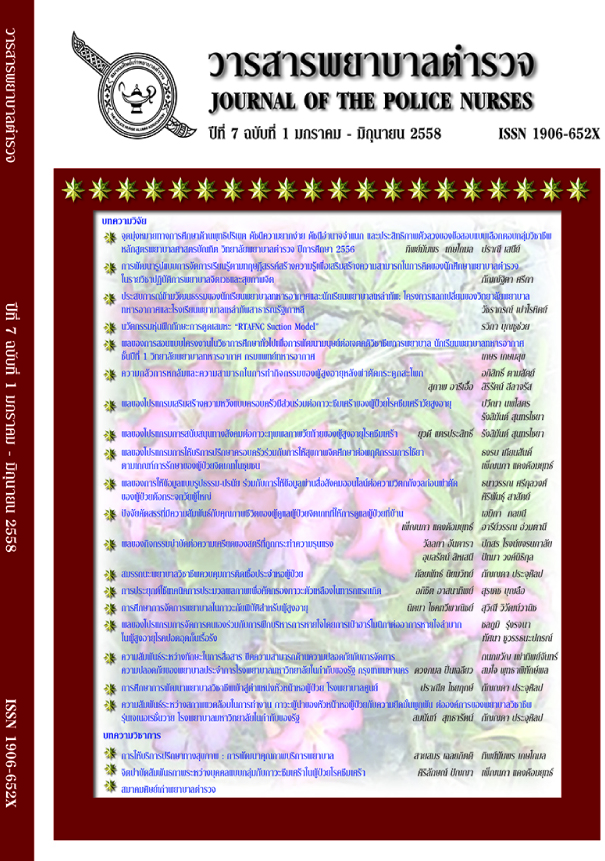ผลของโปรแกรมการสนับสนุนทางสังคมต่อภาวะทุพพลภาพวัยท้ายของผู้สูงอายุโรคซึมเศร้า
คำสำคัญ:
โรคซึมเศร้า, ภาวะทุพพลภาพ, ผู้สูงอายุ, การสนับสนุนทางสังคม, Major depressive disorder, Disability, elderly, Social supportบทคัดย่อ
การวิจัยกึ่งทดลองแบบสองกลุ่มวัดก่อนและหลังการทดลองมีวัตถุประสงค์เพื่อเปรียบเทียบภาวะทุพพลภาพของผู้ป่วยวัยสูงอายุโรคซึมเศร้าก่อนหลังและระหว่างกลุ่มที่ได้รับโปรแกรมการสนับสนุนทางสังคม และกลุ่มที่ได้รับการพยาบาลตามปกติ ตัวอย่างคือ ผู้ป่วยโรคซึมเศร้าที่มีอายุ 60 ปีบริบูรณ์ขึ้นไป แผนกผู้ป่วยนอก จำนวน 40 ครอบครัว และได้รับการจับคู่สุ่มเข้ากลุ่มทดลอง และกลุ่มควบคุมกลุ่มละ 20 คน กลุ่มทดลองได้รับการดูแลตามโปรแกรมการสนับสนุนทางสังคมที่ผู้วิจัยสร้างขึ้น โดยประยุกต์แนวคิดการสนับสนุนทางสังคมประกอบด้วยการดำเนินกิจกรรมเป็นรายครอบครัว จำนวน 5 ครั้ง ๆ ละ 60 นาที ติดต่อกัน 5 สัปดาห์ และได้รับการตรวจความตรงตามเนื้อหาจากผู้ทรงคุณวุฒิจำนวน 5 ท่าน กลุ่มควบคุมได้รับการพยาบาลตามปกติ เครื่องมือที่ใช้ในการรวบรวมข้อมูลได้แก่ 1) แบบวัดความเศร้าในผู้สูงอายุไทย 2) แบบทดสอบสภาพสมองเบื้องต้นฉบับภาษาไทย และ 3) แบบวัดภาวะทุพพลภาพในผู้สูงอายุ มีค่าความเที่ยงสัมประสิทธิ์แอลฟาของครอนบาคเท่ากับ .88, .82 และ .86 ตามลำดับ วิเคราะห์ข้อมูลโดย สถิติเชิงพรรณนาและสถิติทดสอบที
ผลการวิจัยสรุปได้ดังนี้
1) ภาวะทุพพลภาพวัยท้ายของผู้สูงอายุโรคซึมเศร้าหลังได้รับโปรแกรมการสนับสนุนทางสังคมต่ำกว่าก่อนได้รับโปรแกรมการสนับสนุนทางสังคมอย่างมีนัยสำคัญทางสถิติที่ระดับ .05 และ 2) ภาวะทุพพลภาพวัยท้ายของผู้สูงอายุโรคซึมเศร้าในกลุ่มทดลองและกลุ่มควบคุมแตกต่างกันอย่างมีนัยสำคัญทางสถิติที่ระดับ .05
The Effect of Social Support Program on Late-Life Disability among Older Persons with Depressive Disorder.
Abstract
The purpose of this quasi-experimental study was to examine the effect of the social support program on late life disability among older persons with depressive disorder. The sample include fourty older persons, age 60 years and older, whose diagnosed as depressive disorder and theirs family were recruited from the outpatient department. The potential subjects, were randomly assigned to the experimental and the control group, 20 subjects in each group. The experimental group recived 5 session, 60 minutes of the social support program, while the control group received nursing care as usual. The concepts of social support concept were derived into the program and validate for content validity by five professional experts. The
instrument employed in data collection included 1) Thai Geriatric Depression Scale (TGDS) 2) Mini Mental State Examination – Thai 2002, and 3) The late life disability Questionnaire. The Chronbach’s Alpha coefficient reliability of the questionnaire for
instruments was .88, .82 and .86 Data were analyze by descriptive statics and independent t-test
The results were as follows:
1. Late life disability among older persons with depressive disorder in control group after the experiment lower than before experiment were significantly different (p < .05).
Downloads
ดาวน์โหลด
เผยแพร่แล้ว
รูปแบบการอ้างอิง
ฉบับ
ประเภทบทความ
สัญญาอนุญาต
ผลงานที่ได้ตีพิมพ์แล้วจะเป็นลิขสิทธิ์ของวารสารพยาบาลตำรวจ















